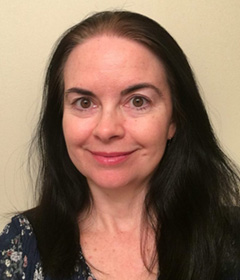- 2019 Candidate Information
- Champaign School Board - Unit #4

Jennifer Enoch
|
What is the importance of the Unit #4 School Board to residents of Champaign? |
The school board serves the broad public interest in making sure that our public schools reflect community values, that they provide a high-quality education to our community’s children, and that our tax money is used responsibly. Our community is stronger when all kids have equal access to high-quality education. Young people need to graduate school able to write and do math, to read well, and to communicate effectively so that they have the tools they need to earn a good living, to participate as citizens in a democracy, and ultimately to fulfill their potential and realize their dreams. |
Why are you qualified to be on the School Board? |
I have been volunteering in Unit 4 schools for the past several years, I serve on the schools district’s Gifted Task Force and Education Excellence Equity Committee, and I was co-chair of the BTW Parent Equity Committee. As a parent, I have been deeply interested in education. During my time volunteering I saw some amazing teachers create excellent conditions for learning in their classrooms, and I saw their students thrive. I’ve also noticed a lot of problems. I feel that we can solve these problems and I’m willing to work hard to improve our schools. |
If elected, what is something you want to accomplish on the School Board, and how long will it take? |
I want to improve the quality of the education our children receive in Champaign’s public schools. Our overall educational outcomes are dismal, as evidenced by standardized test scores and two-thirds of graduates needing remedial classes in community college. For low-income kids and African-American kids, the situation is particularly dire. Only 6% of black children are proficient (at or above grade level) in math. According to ProPublica, the average black child in Unit 4 schools is 3.4 grade levels behind the average same-age white child. We must ensure that every child in our community has equal access to a high-quality public school education. I believe that we have what it takes to remedy these problems: we have a community that values equal opportunity and wants every child to have a fair chance at a great education; our teachers care deeply and work hard; our school system is relatively well-funded compared to many in the state; and we also have particular teachers who excel at doing just the thing Unit 4 as a whole struggles with: educating low-income and African-American kids. We have teachers who are able to help all their students move from at or below grade level at the beginning of the school year to above grade level by the end. They know how they get their great results and can share their strategies with other teachers. I believe that the school board should make it a priority to improve student achievement, and in particular should work on making sure that our low-income and African-American children get a fair shot at a great public education. |
Is there anything else you would like to say to an undecided voter? |
When my child started kindergarten, I began to volunteer several hours a week in the classroom. What I observed in the school moved me deeply. I saw the incredible brilliance of little kids who started kindergarten not yet knowing the alphabet (in education parlance, not “ready” for kindergarten), many of whom told me about serious stressors in their personal lives. My instinct was to try to coddle these children and protect their self-esteem by over-praising them for doing simple tasks, but I noticed that their fantastic kindergarten teacher had very high expectations of them. She asked them difficult questions about math and about books she read aloud, about the nature of heroism during a unit on Martin Luther King and Ruby Bridges, and about friction months after they finished a unit on ramps and balls. I realized that despite many stressors and despite starting kindergarten unfamiliar with the alphabet, these kids were brimming with intelligence, curiosity, and intellectual passions. The same kids who struggled to learn the letters were just as likely as their peers from affluent families to answer the hard questions, to quickly grasp new concepts in math or science, to make up creative stories with an impressive command of language, and to offer deep insights in discussions about books the teacher read to them. Their teacher believed in their enormous intellectual potential and they loved school and thrived. Similarly, most teachers she mentors rapidly become excellent. One of her mentees has won national awards for excellence in teaching science. Two of her mentees consistently moved their low-income black students from below grade level at the beginning of the school year to well above grade level at the end of the school year. If only every child could have teachers like this every year. Providing high-quality, effective, gap-closing education to children who live in poverty is not a mystery, and we can do it! |
Here is a list of links featuring more information on each candidate for this seat:
| Source | Type |
|---|---|
| League of Women Voters Champaign County | Candidate Forum Video |
| News Gazette | Candidate Questionnaire (scroll to bottom) |
Submit a link to more candidate info.
Tweet